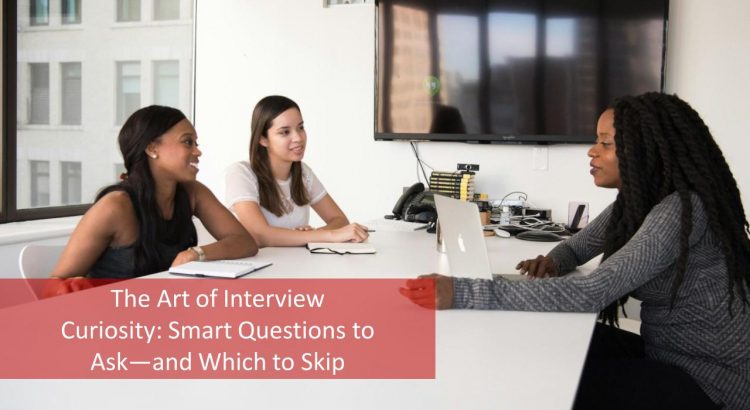Hiring managers don’t merely evaluate what you answer—they notice what you ask. In 2025, nearly half of talent‑acquisition professionals say the candidate experience (including the questions you raise) is the single biggest factor shaping recruiting’s future, and veteran recruiters call a silent candidate a “red flag.”
Below is a playbook—drawn from years of coaching project professionals and sitting on both sides of the interview table—that shows you how to elevate your questioning strategy and avoid the pitfalls that sink otherwise strong contenders.
Does Your Resume and LinkedIn Profile Show Your Productivity?
1. Why Your Questions Matter
- Signals preparation and critical thinking. Sharp questions prove you’ve researched the role and can connect the dots beyond the job posting.
- Reveals stakeholder empathy. In project environments, success hinges on understanding competing priorities. Thoughtful questions show you can anticipate stakeholder needs.
- Flips the power dynamic. Interviews are a two‑way due‑diligence exercise. Your questions help you gauge whether the organization deserves your commitment.
Should You Switch Companies Every 1-2 Years or Stay for Long-Term Growth?
2. A Six‑Category Framework for Questions to Ask
Use one or two questions from each category—then listen actively to tailor your follow‑ups.
| Category | Purpose | Sample Questions |
| Role Clarity & Success Metrics | Nail down expectations and success criteria. | “Six months in, what key deliverables would you expect me to have achieved?” |
| Team Culture & Collaboration | Assess fit and working style. | “How does this team handle conflict when project deadlines collide?” |
| Stakeholders & Governance | Reveal influence networks. | “Which executive sponsors have the most impact on project scope changes?” |
| Growth & Learning | Demonstrate a long‑term mindset. | “What learning budgets or certifications do successful project managers typically pursue here?” |
| Strategic Challenges & Innovation | Show you’re thinking like an owner. | “AI is reshaping PM workflows. Where is the organization already experimenting, and where are the gaps?” |
| Impact & Legacy | Tie your purpose to the company mission. | “Looking ahead two years, what legacy should the person in this role leave for the team?” |
Pro Tip: The Muse’s 2025 list of 70+ questions is an excellent brainstorming source—but curate ruthlessly; aim for ~5 high‑impact questions per interview round.
3. Timing & Tactics
- Early‑round screens – Focus on role scope and culture (Categories 1–2).
- Panel or technical rounds – Dive into governance, strategic challenges, and AI‑driven change (Categories 3–5).
- Final executive round – Lean into impact and legacy (Category 6) and ask what success looks like at the enterprise level.
Always close by summarizing what you’ve heard—this reinforces active listening and clarifies misunderstandings in real time.
Elevating Your Career: Crafting a Communication Plan for Success
4. Questions to Avoid
| Pitfall | Why It Backfires | Safer Alternative |
| Anything easily Google‑able (“What does your company do?”) | Signals poor preparation. | Ask how the company differentiates itself against specific competitor initiatives. |
| Compensation or vacation in the first interview | Jumps the gun; save it until the employer signals serious intent. | Frame curiosity around performance‑linked incentives once the recruiter reopens salary discussion. |
| Gossip or negativity (“I read your Glassdoor reviews—care to comment?”) | Comes off as adversarial. | “How does leadership act on employee‑feedback data?” |
| Overly personal questions about age, family plans, or background | Can be illegal or discriminatory. | Stick to role‑relevant experiences. |
| Questions that judge flexibility(“Can I work remotely whenever I want?”) | Implies you’re prioritizing perks over performance. | “How does the team balance on‑site collaboration with remote work?” |
| “Stump the panel” brain‑teasers | Appear tactical rather than value‑oriented. | Pose a scenario: “If scope triples mid‑project, what’s the first lever this team typically pulls?” |
| Interrogating salary ranges without context | May feel transactional. | Ask how the company benchmarks total rewards for project leadership roles. |
| Future‑casting jobs too fast (“When can I be VP?”) | Suggests impatience. | “What pathways have past project managers followed to move into program leadership here?” |
Indeed’s June 2025 guidance highlights that asking for basic role details—something you should already know—is a top interview faux pas.
Flywheel Your Way to Career Success: How Project Managers Align with Company Goals?
5. Advanced Moves for Senior Project Professionals
- Tie questions to OKRs. “Which OKR will my flagship program move the needle on this quarter?”
- Risk appetite gauge. “What’s the organization’s tolerance for failing fast vs. exhaustive risk mitigation?”
- AI & Data Fluency. With 73 % of TA leaders adopting AI in hiring, ask how the PMO is leveraging predictive analytics for resource allocation.
- Culture of retrospective learning. “How are lessons learned captured and folded back into methodology on multi‑year programs?”
Winning in Life: Overcoming Comfort Zones and Learned Helplessness
6. Bringing It All Together
A candidate who asks focused, strategic, and empathetic questions demonstrates the same competencies that drive successful project delivery: curiosity, stakeholder alignment, and outcome ownership. Prepare 10 questions, prioritize five, and adapt in the moment. When the interviewer finally asks, “Do you have any questions for us?”, you’ll seize the chance to lead the conversation—rather than simply end it.
Strategic Networking: The Project Manager’s Roadmap to Career Lift-Off
Next Step: Sharpen Your Edge
Master of Project Academy’s interview‑coaching add‑on inside our PMP ® Exam Prep and PM Skills courses helps you workshop these questions, practice follow‑ups, and refine your executive presence. Enroll today and turn every interview into a discovery dialogue—one that lands you the role and positions you as the project leader organizations fight to keep.
